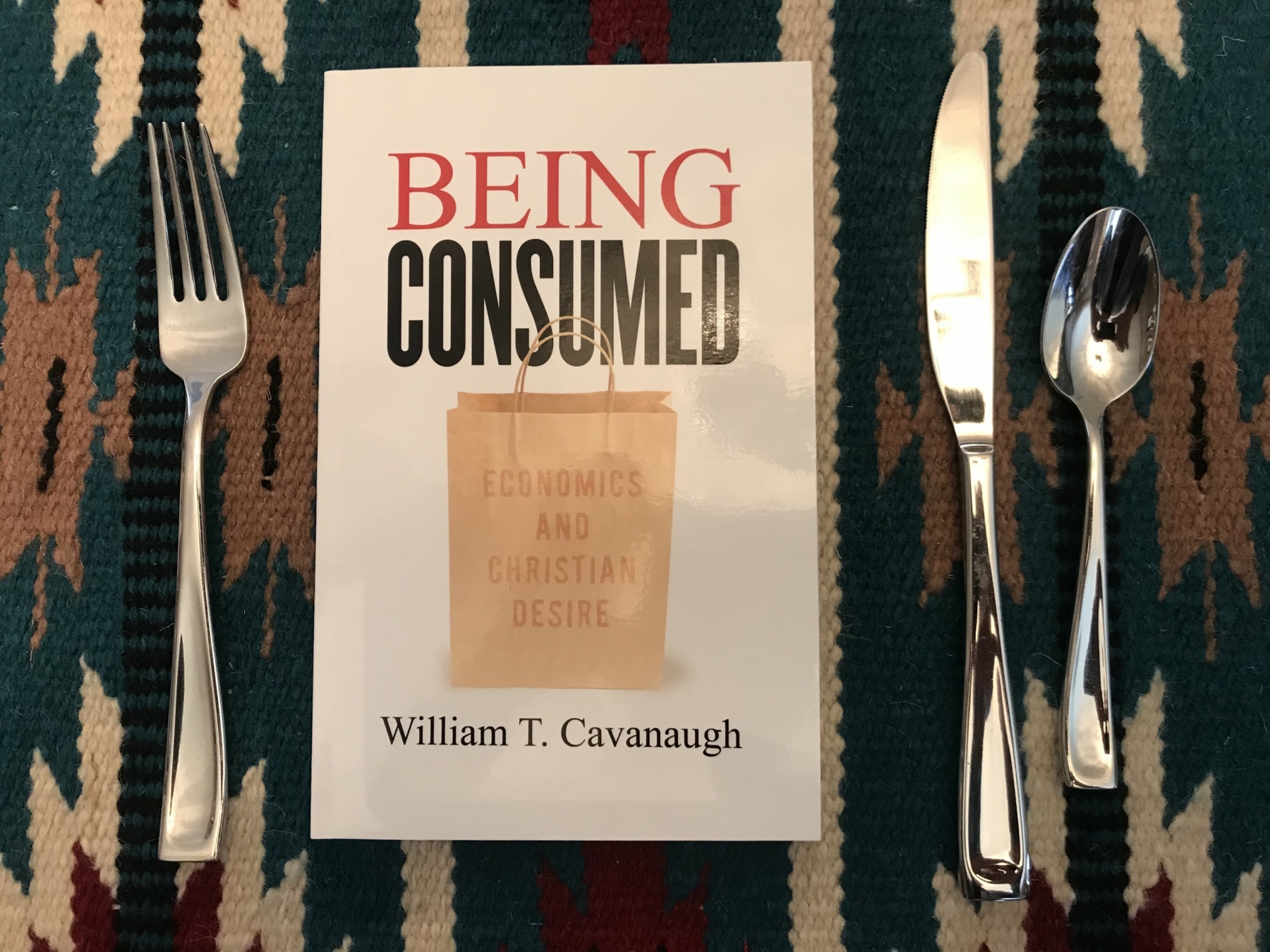If you intend to read only one book on economics this year, I suggest you consider Being Consumed by William Cavanaugh. It’s concise (100 pages) and pretty accessible (only one dense chapter). It is an analysis of free market economics from a perspective that deeply values human flourishing. For Cavanaugh, economics is not merely a philosophical and monetary study about how societies use scarce resources to produce and distribute commodities. He reorientates the conversation so that economics is rooted in the ultimate purpose for which we are created, which, he says, “is participation in the life of God” (p. viii).
William Cavanaugh is professor of Catholic studies at DePaul University (Chicago). He brings the wisdom of St Augustine and the mystery of the Eucharist to let us see economics not merely as commerce but as stewardship of our desires that touches on our deepest yearning for meaning and significance. He references St. Augustine because of his life-giving and definitive thinking about human desire and the Eucharist because it is a sacred spiritual ritual in which we are called to consume and be consumed in love. “The individual consumer of the Eucharist,” he points out, “does not simply take Christ into herself, but is taken up into Christ” and his Body (p. 54).
In four brief chapters, Being Consumed addresses four issues vital for thinking rightly about economics.
First, freedom. Free market ideology asserts that freedom is defined negatively, as freedom from state intervention. I am free if I am not coerced. In contrast, the Christian tradition in Holy Scripture defines freedom positively, as freedom to live rightly. “There is simply no way to talk about a really free economy,” Cavanaugh concludes, “without entering into particular judgments about what kinds of exchange are conducive to the flourishing of life on earth and what kinds are not” (p. 32). This does not suggest state intervention but rather the personal freedom to creatively embrace “the direct embodiment of free economic practices” (p. 32).
Second, consumerism. This is one of the most creative chapters of the book. “What really characterizes consumer culture is not attachment to things,” Cavanaugh says, “but detachment. People do not hoard money; they spend it. People do not cling to things; they discard them and buy other things” (p. 34). “In the Christian tradition, detachment from material goods means using them as a means to a greater end, and the greater end is greater attachment to God and to our fellow human beings. In consumerism, detachment means standing back from all people, times, and places, and appropriating our choices for private use” (p. 52-53). I found this chapter enlightening, convicting, freeing and hopeful.
Third, the global and the local. This is the dense chapter, because Cavanaugh uses the philosophical question of the one and the many to explore how we can live correctly as localized persons in an increasingly globalized world. Though his argument is interesting, feel free to skim sections that are too intense—you can still appreciate his conclusion. Here he brings the reality of the Eucharist into full view. “To consume the Eucharist is an act of anticonsumption, for here to consume is to be consumed, to be taken up into participation in something larger than the self, yet in a way in which the identity of the self is paradoxically secured” (p. 84). In other words, sharing in the bread and wine brings us into a greater reality, the reality of the Body of Christ, without for a moment losing our own identities as individual members. I need not be torn between competing claims of global and local because I can work to “sustain forms of economy, community, and culture that recognizes the universality of the individual person” (p. 86).
And fourth, scarcity. Free market theory assumes scarcity not abundance, and its perspective on markets, consumption and trade are all based on it. “The idea of scarcity implies that goods are not held in common, that the consumption of goods is essentially a private experience” (p. 91). Cavanaugh argues that the Christian vision of life is radically different. The Eucharist is a feast of abundance, God’s abundance, and the oneness of the Body that is celebrated does away with the division between the private and the common good. All I have belongs to God, who has graciously provided it for my use, which is always shaped by my calling to love my neighbor, even at cost, just as Christ loves me and gave himself and all he had for me.
In a discussion in my church of Being Consumed, friends pointed to two weaknesses they saw in the book that are worth mentioning.
First, Cavanaugh identified a number of alternative practices for consumers who wish to participate with faithful stewardship in the free market. These include, for example, Fair-Trade networks and purchasing directly from local food producers. The criticism is that he recommends them without exploring their merits and difficulties. True, and doing so would have strengthened his conclusions. It would also have increased the length of the book. Full disclosure: Margie and I have long been actively involved in some of the alternative economic arrangements Cavanaugh suggests, so perhaps my own research and ongoing practice makes me feel this lack in the book is not significant. Still, I do not dispute that including more on this would have been good.
The second criticism is that not all businesses operate according to the free-market ideology that Cavanaugh attributes to the economist Milton Friedman. This is, of course true. It is also a bit beside the point. The question Cavanaugh is addressing in Being Consumed is not whether there are good people in good businesses offering good services and products for the common good. He is asking, rather, whether the free market itself and the popular ideology associated with it subtly shapes the values, beliefs and practices of ordinary consumers. Cavanaugh concludes, Yes, and I agree with that assessment. To use James K. A. Smith’s terminology, the free market, for all its benefits and helpfulness, generates cultural liturgies that mold our hearts and desires, often in ways that are directly opposed to the values, beliefs and practices of God’s kingdom. Identifying this almost imperceptible process is Cavanaugh’s concern. And this is an important concern, because if David Koyzis in Political Visions and Illusions (2019) is correct—and I am convinced he is—modern ideologies are seductive idolatries that must be resisted by all followers of Jesus.
I realize that many White evangelicals will hesitate to read Being Consumed. They hesitate because they feel caught between two options: accept the free market or accept greater state intervention. They don’t need to read books to do the first, and no argument will make them accept the second. If this describes you, then Being Consumed is for you. Cavanaugh does not argue against a free market or for state intervention in the marketplace; he argues that the rich resources of the Christian tradition and Church stand outside the reductionistic binary of Right and Left, conservative and progressive. “I argue,” he says, “that Christians themselves are called to create concrete alternative practices that open up a different kind of economic space”—a space where human flourishing can prosper (p. viii). This is an invitation to creativity and individual economic faithfulness that is rooted in a biblical worldview and flows out in faithful living.
Cavanaugh writes as if he believes passionately that the truth of Jesus speaks to every aspect of life and culture—including economics—and not just on the level of theory or doctrine, but on the level of ordinary practice. “[T]he Christian vision of economics that animates this book is not impractical but may in fact be the most practical of all ways to live out the Christian life” (p. xii).
If you are a follower of Jesus, please consider reading this provocative and challenging explanation of how our economic faithfulness can be lived out for the good of our neighbor and the glory of God. If you are not a follower of Jesus, this bracing expression of the possibilities of Christian faith might suggest you consider the claims of Jesus as Lord.
Questions for reflection and discussion:
The discussion of Being Consumed in my church was led by Tyler Holley. With his kind permission I am including here the discussion guide he produced:
Overall thoughts:
- What stuck out to you? What caused the most perplexity? What was encouraging? What annoyed you?
Chapter 1:
- Cavanaugh argues that Capitalism’s underlying view of freedom, as proposed by its leading theorists, is severely lacking not only from a Christian and philosophical perspective but also from a practical perspective. In regard to freedom, what do you think of his analysis? What does he see clearly? Does he miss anything?
- Does this chapter change anything about the way that we live in and think about the political, economic, the social realms of our life?
Chapter 2:
- Cavanaugh contends that Capitalism is a school of formation that forms us to be detached from the world and from others in a way that is counter to the Christian story. What does this detachment look like? And what is its effects on our life? Do you sense this detachment in your own life? How so? (If you disagree with his assessment, then bring that up too!)
- As an antidote to Capitalism’s school of formation he argues for the formation of the Eucharist. How does the Eucharist help us in “attachment?” How can we extend these effects into other areas of our life?
Chapter 3:
- Cavanaugh claims that Capitalism has failed to be genuinely and ethically local and global. What stood out to you in this chapter in regard to being genuinely local and global? How have we as a society failed? How can we improve?
- Chapter 3 is by far the densest chapter in the book. Was there anything that stood out to you as encouraging or puzzling?
Chapter 4:
- Cavanaugh suggests that scarcity is created by the idea of exclusive individual ownership and individual consumption. How does the eucharist change our view of scarcity? And how can we showcase a Eucharistic understanding of property ownership?
Discussion guide © Tyler Holley 2021, used by permission.
Book recommended: Being Consumed: Economics and Christian Desire by William T. Cavanaugh (Grand Rapids, MI: William B. Eerdmans Publishing; 2008) 100 pages + index.
Photo credit: by the author on his iPhone



